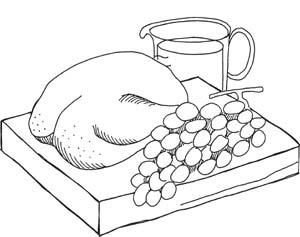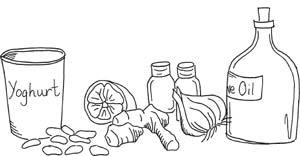Nourishing Traditions: The Cookbook That Challenges Politically Correct Nutrition and The... (82 page)
Authors: Sally Fallon,Pat Connolly,Phd. Mary G. Enig
Tags: #Non-Fiction, #Reference, #Science, #Health
Gumbo soups are often flavored and thickened with file powder (pronounced "fee-lay"), which is mucilage obtained from the dried and powdered leaves and pith of the sassafras tree. The Choctaw Indians of Louisiana are responsible for introducing file powder to the French of New Orleans. The leaves were gathered in the Fall, dried in the sun and pounded in a wooden mortar. To prevent the powder from becoming stringy, it should be added to soups and stews after removing them from the stove. File powder may also be placed on the table in a salt shaker and added according to preference. SWF
CHICKEN STEW
Serves 8-10
2 whole chickens, cut into pieces
2 cups red or white wine
3 tablespoons butter
3 tablespoons extra virgin olive oil
about 2 cups unbleached flour
2 teaspoons each sea salt and pepper
3 tablespoons butter
4 cups
chicken stockseveral sprigs fresh thyme, tied together
2-3 small pieces lemon peel
1 teaspoon dried green peppercorns, crushed
10-15 small red potatoes
1 pound fresh mushrooms
2 pounds medium boiling onions
4 tablespoons butter
4 tablespoons extra virgin olive oil
2 tablespoons parsley, finely chopped
Mix chicken pieces with wine and marinate in the refrigerator for 4 to 12 hours. Dry pieces well with paper towels, reserving marinade. Make a mixture of flour, salt and pepper. Melt butter and oil in a large, flameproof casserole. Dredge chicken pieces in flour mixture and brown on both sides in butter and oil over medium heat, a few at a time, reserving on a plate. Pour out browning fat and melt 3 tablespoons butter in the casserole. Add about ¾ cup of the flour mixture and cook, stirring constantly, for several minutes or until flour becomes lightly browned. Add wine marinade and chicken stock to casserole, blending well using a wire whisk. Bring to a boil and skim. Add thyme, peppercorns, lemon peel and chicken pieces to the pot, cover and bake at 325 degrees for about 2 hours. One hour before serving, add potatoes to the casserole.
Meanwhile, wash the mushrooms, dry well and saute them, whole or sliced, in 2 tablespoons each of butter and olive oil. Peel the onions and saute them gently in the remaining butter and olive oil for about 20 minutes. Just before serving, add mushrooms and onions to the casserole and stir in chopped parsley.
Your body makes saturated fats, and your body makes cholesterol—about 2000 mg per day. In general, cholesterol that the average American absorbs from food amounts to about 100 mg per day. So, in theory, even reducing animal foods to zero will result in a mere 5% decrease in the total amount of cholesterol available to the blood and tissues. In practice, such a diet is likely to deprive the body of the substrates it needs to manufacture enough of this vital substance.
The Oiling of America
If the best current knowledge were employed, enough food to feed the four billion people could be grown in the southern half of Sudan! It is only the Western bias, the idea spread throughout the world that one must eat white grain and drink soda pop to be "civilized," that is responsible for the suffering of the millions of starving people in the world. It is a myth that there is not enough to go around, that there is no way the Earth can support its exploding population. The truth is that most of the world's food resources are controlled by a handful of greedy men, who deny people the right to grow food for themselves but try to sell them Western-produced junk instead. [Some experts] estimate that if all the arable land on earth were used properly and sowed with foods for human consumption, the Earth could support 60 billion people—almost fifteen times our current population! But it is true that there is no way we can feed the world population on Whoppers and Cheez-Wiz, let alone nourish it. Paul Stitt
Fighting the Food Giants
CORNISH GAME HENS WITH GRAPES
Serves 4
2 Cornish game hens, split lengthwise
2 tablespoons extra virgin olive oil
2 tablespoons melted butter
sea salt and pepper
½ cup dry white wine or vermouth
2 cups
chicken stock2 cups fresh grapes, red or green
2 tablespoons arrowroot mixed with 2 tablespoons filtered water
Place game hen halves, skin side up, in a stainless steel baking pan. Brush with a mixture of butter and oil and season with salt and pepper. Bake at 375 degrees for about 1½ hours. Remove to a heated platter and keep warm in the oven while making sauce.
Pour wine or vermouth into the pan and bring to a boil, stirring with a wooden spoon to scrape up any accumulated juices in the pan. Add chicken stock, bring to a rapid boil, skim and let the sauce reduce for about 10 minutes until it thickens. Add the grapes and simmer about 5 minutes more. Spoonful by spoonful, add arrowroot mixture until desired thickness is obtained. Transfer game hens to individual plates and pour sauce over.
Cholesterol is. . .the central structure in the steroid group that includes the female and male hormones, the contraceptive pill, cortisone, vitamin D, and the steroid drugs that some athletes and older movie stars take. Cholesterol, despite all the bad press it has received, is a vital material in the human organism. It is part of the bile acids that digest fats, a major component of brain and nerve tissue, and a forerunner of many hormones, particularly the sex hormones. Cholesterol is found widely in animal foods (eggs, dairy products, poultry, shellfish), and our bodies manufacture significant amounts of it every day. "Without it the skin would dry up, the brain would not function, and there would be no vital hormones of sex and adrenal."
In the Big Fat Controversy, some researchers have reported statistical correlations between blood cholesterol levels and heart disease. Despite an enormous effort, however, scientists have not been able to establish, among normal healthy people on a good diet, understandable links between the cholesterol in one's food, the cholesterol in one's blood, and heart attacks or strokes. To the degree there are relationships—as there are among myriad factors and events in the body—no one knows what is causing what. Joseph D. Beasley, MD and Jerry J. Swift, MA
The Kellogg Report

CORNISH GAME HENS, INDIAN STYLE
Serves 4
2 Cornish game hens, split lengthwise
½ cup plain yoghurt
1 teaspoon ground cumin
1 teaspoon turmeric
1 teaspoon ground fenugreek seeds
1 tablespoon lemon juice
2 cloves garlic, peeled and mashed
½ teaspoon freshly grated ginger
½ teaspoon paprika
½ teaspoon salt
1 tablespoon extra virgin olive oil
2 tablespoons crispy almond slivers (
Crispy Almonds
)
Combine yoghurt, cumin, turmeric, fenugreek seeds, lemon juice, garlic, ginger, paprika, oil and salt in a large bowl. Brush on game hens and marinate in refrigerator for 4 to 6 hours. Place game hen halves, skin side up, in a stainless steel baking dish, spoon on any remaining marinade and bake at 375 degrees for about 1 ¼ hours. Sprinkle almonds on and bake another 15 minutes.
The Medical Research Council of Great Britain in 1968 did a study in which the fate of patients put on a low-saturated fat diet after a heart attack was determined and compared to patients on a high-saturated fat diet. They concluded that the unsaturated fat diet had no effect on the ultimate course of the patients. The number of second heart attacks and deaths were the same in both groups. Two other studies, one done in Oslo, Norway and one in England, came to the same conclusion. William Campbell Douglass, MD
The Milk Book
—How much, sir? asked the old woman.
—A quart, Stephen said.
He watched her pour into the measure and thence into the jug rich white milk. . .. Old and secret she had entered from a morning world, maybe a messenger. She praised the goodness of the milk, pouring it out. Crouching by a patient cow at daybreak in the lush field, a witch on her toadstool, her wrinkled fingers quick at the squirting dugs. . ..
—It is indeed, ma'am, Buck Mulligan said, pouring milk into their cups.
—Taste it, sir, she said.
He drank at her bidding.
—If we could only live on good food like that, he said to her somewhat loudly, we wouldn't have the country full of rotten teeth and rotten guts. Living in a bogswamp, eating cheap food and the streets paved with dust, horsedung and consumptives' spits.
—Are you a medical student, sir? the old woman asked.
—I am, ma'am, Buck Mulligan answered.
James Joyce
Ulysses

TURKEY WITH CHESTNUT STUFFING
Serves 12-18
1 16-20 pound turkey
8 cups whole grain bread crumbs
2 teaspoons rubbed sage
2 teaspoons dried thyme
1 teaspoon sea salt
1 teaspoon pepper
4 medium onions, peeled and chopped
1 bunch celery, chopped
½ cup butter
2 cups chestnuts, coarsely chopped (see
chestnuts
)large needle and thick thread
2 onions, peeled and sliced
1 cup unbleached flour
4-6 cups
turkey stockcooked giblets, finely chopped (optional)
Remove neck and giblets from turkey and use for making stock (
chicken stock
). Saute onions and celery in butter in a large skillet until softened. Mix with bread crumbs, seasonings and chopped chestnuts. The stuffing may be made ahead of time, but you should wait until you are ready to cook to stuff the turkey.Stuff the neck cavity loosely and sew skin flaps to the body of the turkey with a large needle and thick thread. Stuff the main cavity loosely and fasten with skewers or merely bring the legs through a slit cut just behind the tail. Strew sliced onions in a large roasting pan. Set a rack over the onions and set turkey on the rack. Rub skin with salt and pepper and bake at 350 degrees for about 5 hours, basting frequently.
Remove the turkey to a carving board. Sprinkle flour in the drippings and cook over a medium flame about 5 minutes, stirring constantly. Add stock and blend with a whisk. Bring to a boil and cook several minutes, stirring occasionally. Strain gravy into a saucepan and allow to simmer for ½ hour or so until it reduces and thickens. Stir in optional giblets. If gravy gets too thick, thin with a little water.